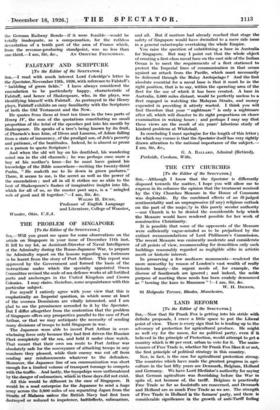THE PROBLEM OF SINGAPORE
[To the Editor of the SPECTATOR.] Sin,—Will you grant me space for some observations on the article on Singapore in your issue of December 17th inst. ft fell to my lot, as Assistant-Director of Naval Intelligence at the Admiralty during the Russo-Japanese War, to prepare the Admiralty report on the lessons regarding sea fortresses to be learnt from the story of Port Arthur. This report was approved by the Government and formed the basis of the instructions under which the specially appointed Owen Committee revised the scale of sea defence works at all fortified ports and anchorages in the United Kingdom and Crown Colonies. I may claim, therefore, some acquaintance with this particular subject.
For myself I entirely agree with your view that this is emphatically an Imperial -question, in which some at least of the oversea Dominions are vitally interested, and I am glad to see the prominence accorded to it by the Spectator. But I differ altogether from the contention that the problem of Singapore offers any prospective parallel to the case of Port Arthur, or that we may anticipate the necessity of sending many divisions of troops to hold Singapore in war.
The Japanese were able to invest Port Arthur in over- whelming force only because they had first driven the Russian Fleet completely off the sea, and held it under close watch. That meant that their own sea route to Port Arthur was absolutely safe for the conveyance of attacking troops in any numbers they pleased, while their enemy was cut off from sending any reinforcements whatever to the defenders. Moreover, the Japanese line of sea communication was short enough for a limited volume of transport tonnage to compete with the traffic. And lastly, the troopships were unthreatened by the danger of submarines, which in those days did not exist.
All this would be different in the case of Singapore. It would be a mad enterprise for the Japanese to send a .huge army across the 3,000 miles of sea separating Japan from the Straits of Malacca unless the British Navy had first been destroyed or reduced to impotence, battlefleets, submarines, and all. But if matters had already reached that stage the safety of Singapore would have dwindled to a mere side issue in a general catastrophe overtaking the whole Empire.
You raise the question of substituting a base in Australia for Singapore. But may I point out that the whole object of creating a first-class naval base on the east side of the Indian Ocean is to meet the requirements of a fleet stationed to protect the Imperial lines of communication in that ocean against an attack from the Pacific, which must necessarily be delivered through the Malay Archipelago ? And the first absolute essential for a naval base is that it must be in the right position, that is to say, within the operating area of the fleet for the use of which it has been created. A base in Australia, 3,000 miles distant, would be perfectly useless to a fleet engaged in watching the Malayan Straits, and money expended in providing it utterly wasted. I think you will find therefore that your " nightmare " is only a nightmare after all, which will dissolve to its right proportions on closer examination in waking hours ; and perhaps I may say that these views are the result of six years' laborious study of kindred problems at Whitehall.
In concluding I must apologize for the length of this letter; for which my excuse is that the Spectator itself has very rightly drawn attention to the national importance of the subject.— I am, Sir, &c., G. A. BALLARD, Admiral (Retired). Parkside, Corsham, Wilts.










































 Previous page
Previous page